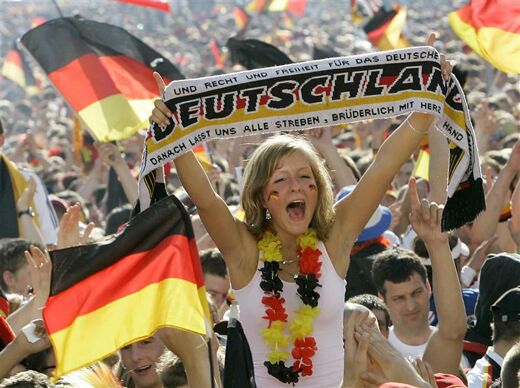
World Cup Gives Germany Self-Confidence
The cumulative viewership of this year’s World Cup is estimated to be 32 billion people. That is an average of every man, woman and child on Earth watching roughly five of its soccer matches. As the host nation, Germany has the world eating from the palm of its hand. The publicity value to this “reformed and democratized” Germany is priceless. For an entire month, Germany is the center of attention.
The World Cup will pass, but we must not turn our attention from Germany because, as many politicians have recently lauded, the World Cup has nurtured a strong sense of open patriotism in Germany, an attitude not seen since the fall of the Berlin wall. Time will prove the significance of these trends emerging in the Fatherland.
German President Horst Köhler on June 16 remarked that the pride resulting from his country’s success in the World Cup was a sign the country was “returning to normal” after decades of German patriotism struggling under the weight of its Nazi past.
Interior Minister Wolfgang Schäuble commented that it was good that people were no longer averse to German national colors. “Only notorious grouches say they don’t welcome it.”
One Christian Democratic politician told the German press that the country is “in a phase in which young people are more self-confident” about their nationality.
For decades, open displays of patriotism were discouraged in Germany, but since the World Cup, the black, red and gold German flag has been waving from cars and buildings, while soccer fans dress in national colors and chant “Deutschland.” Politicians have praised the trend, encouraging all of Berlin to hoist the national standard.
German nationalism is steadily reviving. A review of history tells us that, in times past, this seemingly small trend has had global ramifications.
Over the past 60 years, Germany has tended to de-emphasize its own history—embarrassed by its central role in two world wars. German historians now believe this educational void has precipitated an identity crisis, especially with the young. Too many Germans, they believe, simply don’t know “who they are.” But seeing the enthusiasm among the nation’s young today as they celebrate the new Germany indicates that this trend is shifting rapidly.
Given the evils perpetrated the last time German nationalism waxed strong, it is naive to ignore the serious implications of this trend in Germany today. German aggrandizement should make our hearts beat faster. Stratfor predicted that “2006 will mark a new turning point as Germany begins to ascend for a fourth time”!
